- Home
- Jean Stone
The Summer House Page 8
The Summer House Read online
Page 8
Finally Father lumbered back toward land, his head bent, his hand passing over his face as if wiping away … tears?
For nineteen years, BeBe had wanted to despise this controlling, intimidating man who was her father. Now here he looked … lonely. And vulnerable. Feelings BeBe understood well. He looked almost human.
She lingered in the ticket office until she saw him cross the street, until it was safe to leave and try and hitch a ride. Then an odd thought came over her: Father. Should she ask Father to take her home?
She went outside and saw the top of his graying head as it moved toward the parking lot. She headed quickly across the street.
Just as she was about to catch up with him at the Buick, a woman appeared next to him. She was dressed all in white from her tank top to her capris to her high-heeled sandals, even to the chiffon scarf that tied back her long, blond hair. BeBe had no idea who she was. She did not look much older than BeBe herself.
And then the woman … Holy shit, BeBe thought.
The woman wiped the tears from Father’s cheeks and kissed him, full on the lips.
Her first thought was to run. BeBe bolted as if she’d been shot in the head and the heart at the same time. She darted around the cars in the lot, bumping into side-view mirrors and stumbling over her sandals, her damn lace-up sandals that typified her “free-spirited soul,” as Daniel had called it, and were in no way designed for running away, at least, not literally.
“Bastard” was the only word she could coherently piece together among the words and images that whirred in her brain.
William Woodman Adams, pillar of society, head of the most important family this side of the fucking Atlantic if you asked him … William Woodman Adams was nothing more than a two-timing, phony, lying piece of pretentious shit.
As she’d always suspected.
She wanted to run away and forget she’d ever seen what she’d seen.
Then she thought of Mother. Innocent, hurt-no-one, raised-four-children Mother. The woman who had endured Father’s crap for too many years. And suddenly BeBe’s desire to escape was replaced by another need: this one, to rip out the woman-in-white’s bottle-blond hair, then kick Father squarely in his balls.
Taking a deep breath and rubbing her side, BeBe raised her head and marched back toward the Buick.
“It’s not what you think,” Father said when he turned and saw the look on BeBe’s face.
The woman stepped forward and put her hand on BeBe’s arm. BeBe recoiled. “My name is Lucy Talbot,” she said. “I’m Hugh Talbot’s wife.”
“How convenient, Father,” BeBe sneered, “that both of you are married.” What a big, fat waste of time. She started to turn away; Father grabbed her shoulder and held her there.
“Just who do you think you are, young lady?”
She snapped back. “Don’t call me ‘young lady.’ Why don’t you tell your friend here what you really think of me? Maybe you can tell her over cocktails, while your family is home waiting … without Daniel.”
“If we weren’t on a public street …”
“Wait just a minute,” Blondie interrupted. “Stop it, both of you. This is my fault. Your father got my husband a job. Thanks to him, Hugh is a sheriff. I was thanking your father. That’s all.”
BeBe frowned. Talbot. She vaguely remembered hearing the name. “Do you kiss every man who gets your husband a job?”
The woman shook her head. “You don’t understand. Hugh was in the Army. He was on his way to Vietnam. But your father intervened …”
BeBe squinted. “Excuse me?” she interrupted. “My father … intervened?”
Father moved his hand toward the woman. “Lucy,” he said, “I’d rather not …”
“No, Father,” BeBe said, her lips barely moving. “I want to hear this.”
The woman sighed. “Your father used his connections to get my husband out of going to Vietnam. Congressman Carter helped.”
The breeze that perpetually blew off the water now stopped, or at least seemed to stop, turning the air suddenly quiet and still. BeBe pulled her eyes from the woman and looked at Father.
Father had found a way to stop this woman’s husband from going to Vietnam.
“Lucy’s father sent some business my way,” Father was saying. “We needed a good sheriff here. Hugh Talbot was qualified …”
“And we needed Daniel,” BeBe said. She pulled away from his hand. “But you let Daniel go off to war.” Slowly she turned and began walking away, her sandals slapping the pavement.
“But Daniel is going to be president,” Father called out, his words following her. “He will be a hero … Just you wait and see.”
BeBe wrapped her arms around herself to stop her insides from spilling out onto the street, to try and hold back her wish that Father had simply been having a fling the way other men might have done. It would have hurt less. It might have even been forgivable.
Chapter 9
All afternoon the sun played that peekaboo thing with the clouds, as if unable to decide whether it should be happy or sad.
Liz sat on the back porch swing, her mood shifting as she rocked. Daniel … Josh; Daniel … Josh. The ache for Daniel was winning over the anticipation for her date with Josh, even though she’d spent over an hour deciding what to wear (jeans and a white, short-sleeved turtleneck) and how to fix her hair (long and straight with a beaded headband).
Father had not spoken since returning home from seeing off Daniel. He’d simply gone into his study and closed the door. Liz wondered if they should forget the summer and the Vineyard and go back to Boston where they could visit museums and shop and walk down Newbury Street and poke into the art galleries. In the city they could practically see a different movie each night; they could find street fairs and outdoor concerts and stroll from the Common to the aquarium and back again, or ride the T a whole day as she and BeBe had done a few years ago when Daniel bet them they couldn’t. Or wouldn’t. There was so much more to do in Boston than here. The only problem was, Liz thought, swinging the swing again, Josh Miller was not there. He was here.
She met him at the end of the dirt road that led to her house. He drove a small, dark green convertible. Liz asked him to put the top up, terrified that Father would somehow see Liz speeding off with a boy who not only was not Michael Barton, but who was a Jew.
“I thought we could go to the Strand,” Josh said, maneuvering the sports car down the winding, tree-lined street. “Have you seen Cabaret?”
Yes, she had seen the new film starring Liza Minnelli. And she could think of a thousand places they should go other than one of the two movie theaters in Oak Bluffs—right there on Circuit Avenue, out in the open. But when she looked into Josh’s mahogany-colored eyes, what she said was: “I’ve heard it’s good.”
He smiled and shifted into third gear.
They never made it to the movies. After parking the car, they started down the hill, when Liz glanced in the window of McClelland’s Café and noticed a familiar figure on a barstool.
“Wait,” she told Josh. “That’s BeBe. My sister.” She slipped to his other side, trying to duck from view. “I can’t let her see me.”
Josh looked through the glass and frowned. “Maybe she’s the one who should worry about being seen. She looks pretty drunk.”
That surprised Liz. For all BeBe’s shortcomings, drinking was not one of them. Well, not that she knew. She began moving toward the theater, but Josh reached out and stopped her.
“It looks like she’s alone,” he said. “She might need our help.”
Liz was annoyed, Didn’t Josh get it? She started to protest, when she caught sight of BeBe again through the café window. Her sister was slouched, head drooping, an orange-haired Raggedy Ann. On the bar in front of her were a tall, half-full beer and several shot glasses, some empty, some not. Josh was right. BeBe was drunk.
Liz took a deep breath. “You’re right,” she said. “I have to go in. Something must be wrong.”
> “I’ll go,” Josh said.
She began to protest, then changed her mind. Sooner or later BeBe was bound to find out about Josh. Right now it seemed more important to get her sister out of the bar.
Liz watched as Josh went inside. Without attracting attention, he approached BeBe and began talking. Liz wished she could hear what he was saying.
Then he took some money from his pocket, set it on the bar, and put his arm around BeBe’s waist. He propped her sister against him and led her rubbery-legged body out onto the sidewalk.
“Hey, Lizzie,” BeBe slurred. “What are you doing here?”
Liz shook her head. “BeBe,” she said, “you’re drunk. I can’t believe you’re drunk.”
BeBe belched. She slumped against Josh then turned and looked at his face, as if seeing it for the first time. “Hey,” she mumbled, “who are you?”
“That’s Josh,” Liz said. “Remember him?”
BeBe took a long look. “Oh, that’s right. I know you. You’re the Jew.”
Liz grabbed BeBe’s arm. “We need to buy you some coffee.”
But BeBe’s eyes remained fixed on Josh. “Did you see him around here? Did you see my jerk of a father?” She began to wave her arms. “Over there,” she called. “In the Buick.” Then she passed out against him.
Liz wanted to cry. “Let’s get her to the car,” she begged, and tried to prop BeBe up.
“She needs to lie down,” Josh said. “My car’s too small. Let’s get her to the beach.”
Between them, they lugged BeBe across the street, past the ferry pier, and down onto the beach. Liz sat on the sand next to her sister, while Josh went back to the car to get a beach blanket he said he kept “for emergencies sort of like this.” Liz tried not to think about what that meant, and instead, she focused on her sister. Her dead-drunk, passed-out, in-trouble-again sister.
“Father is going to kill us,” she said. “Oh, BeBe, I have a feeling we’re going to make an awful mess of things with Daniel away. Let’s try not to, okay? Let try to make Daniel—and Father—proud of us. Let’s not get in any more trouble, okay?”
Beside her, BeBe snorted.
“Oh, Beebs,” Liz said. She felt a chill in the fading sunlight. “I didn’t want to have a terrible summer. I wanted to have a wonderful summer. But it’s all ruined now … now that Daniel’s gone away.”
Her sister moved. “Bastard,” she muttered. “I’m going to kill the bastard for what he’s done.”
Liz leaned down. “Kill him?” she asked. “Kill who? Kill Daniel for leaving?”
Instead of answering, BeBe gurgled. She rolled into the sand and puked.
The next morning, BeBe wouldn’t talk about it. She wouldn’t tell Liz why she’d gotten drunk, why she was angry, or whom she intended to kill. She only said she was leaving the island: she was going to summer school at Mount Holyoke; she was not staying here another “goddamn minute” longer than she had to.
“You’re leaving me, too?” Liz cried. She was standing at the doorway to BeBe’s room, watching her sister pack.
“Believe me, kid,” BeBe said, taking a second to touch Liz’s cheek, “it’s better this way.”
It had been lucky for them that Josh got them home last night before their parents returned from the Burnses’, lucky for them that Josh helped haul BeBe upstairs to her room and put her in bed before anyone knew what had happened, including Roger, who wasn’t home either.
“You can’t leave me,” Liz pleaded. “Please say you won’t.”
BeBe shrugged. “You’ve got your boyfriend now. It won’t be so bad.”
“My boyfriend? I have to sneak out to see him! What kind of fun will that be?”
BeBe smiled faintly. “You may be surprised. Just be careful, Lizzie. That’s all I can say.”
“BeBe, please …”
But BeBe snapped the suitcase shut and lifted it from the bed. “I’m out of here, Lizzie. I called Tuna this morning and he agreed to drive me to the ferry. Say good-bye to Mother for me. And Roger.”
She headed for the doorway. “And if anyone asks, just tell them I didn’t feel like spending the summer hung-over.”
When Roger Adams called and asked if Evelyn could drive him to the ferry, she was surprised and she was pleased.
“I need to go into town today,” he said, adding that his father couldn’t drive him because he was off-island, which Evelyn knew was a lie because Will Adams had called only ten minutes before Roger to ask about Grandfather’s condition.
But Roger had asked and he was Daniel’s brother. It certainly wouldn’t hurt to score as many points as possible with that family, even though she was still angry that Daniel had not let her see him before he left.
Besides, driving Roger to the ferry would be a welcome break from her distress over Grandfather’s deteriorating condition. The doctor had been by this morning and told her that Grandfather had taken a turn for the worse. The stroke had left him unable to walk or talk or do much of anything but hiss at his nurses and drool when he ate. How much worse could it get?
“Maybe I’ll jump on the ferry and go to Boston with you,” she said suddenly.
Roger paused. “I, ah, I have a meeting,” he said.
Evelyn laughed. “I could go shopping while you’re in your meeting. That way, you wouldn’t have to take the bus back to the ferry.”
Roger was silent.
“There’s nothing wrong with that, Roger. I’ll make sure Daniel understands that we are just friends.”
Finally he spoke. “Do what you want, Evelyn. But I’m not sure I’ll be returning tonight.”
As she drove back on Route 128 south toward the Cape, Evelyn glanced at Roger. How was it possible that the son of God-and-country Will Adams and the brother of Mr. West Point Daniel could try and enlist in the Navy and be told he was 4-F? Not acceptable for duty. Impaired.
“It’s my allergies,” Roger had explained after Evelyn had pried out of him the reason he’d gone to Boston and she’d met him outside the recruiting office. “My stupid allergies. They don’t care that I know how to take care of it. They just don’t want me.”
He looked like he was going to cry right there in the middle of the street. Evelyn knew that it didn’t take a psychiatrist to figure out why Roger wanted to enlist when he still had one year left of college. It was simply a matter of Daniel, an effort to finally be like big brother. It had, of course, failed, because Roger was Roger, not Daniel.
She felt sorry for him, but did not know how to show it. Silence was better than saying something stupid, something that might add to poor Roger’s distress.
So they made the trip back to the Vineyard mostly in silence, an accomplishment for which Evelyn applauded herself. When she dropped Roger off at the house, he asked if she would please keep his secret.
“If my father ever found out I tried to enlist, he’d kill me,” he said, his face pale and distraught.
“I’m supposed to be the lawyer in the family. Daniel’s the soldier. Father would hate it if he knew I was trying to change his plans.”
It was hard to believe that even Will Adams had put such fear into one of his own.
Despite what Roger asked, Evelyn decided she’d ask Grandfather if he thought it was true. Besides, Grandfather could keep a secret.
This last thought turned out to be most assuredly true, for when Evelyn arrived back at her house, Congressman Carter was dead.
Chapter 10
He kissed her.
Three days after Daniel left and two days after BeBe did, Father, Mother, and Roger went up to Boston for Congressman Carter’s funeral. Father had wanted Daniel to be there but it was too soon for him to leave boot camp. But even if Daniel had been there, Liz would not be. Instead, she had feigned menstrual cramps. Under ordinary circumstances, Father would not have allowed her to stay alone on the island overnight, but nothing about these days seemed ordinary. Father had barely blinked when he’d learned BeBe was gone; Mother had commented that sum
mer school should be fun for BeBe. And then the congressman had died, and they had all left for the funeral, and Liz had waited for her chance to see Josh.
She had waited all day. She had counted the hours and minutes and once even the seconds until she had known Josh would be out walking Snuffy. Now here she was—here they were—standing in the moonlight by the old rowboat at the cove, and he had his lips on hers, and she knew there was nothing more delicious or wonderful in the whole world than his hands on her waist and their bodies pressed together.
It was Josh who pulled back with a low laugh. “Wow,” he said. “I guess we’d better stop.”
She did not want to stop.
He studied her face. With the lightest touch of his fingertip he traced her chin, her nose, her eyebrows, her cheeks. He took her hand in his. “I want to show you something,” he said.
Holding her hand, he led her alongside the water. Snuffy danced in and out of view as they moved from the cove to the rocky stretch of beach that separated the Adamses’ house from the others.
“Look.” He pointed to a house that sprawled above the dunes. It was deep gray in the moonlight and the shadows, imposing in the night salt air; a house not unlike Liz’s. “That’s my house,” he said. “My family’s house.”
“You’re my next-door neighbor.”
“It’s more than a house, Liz. It represents lifetimes—generations—of struggle.” She did not know how to respond because she did not know what he was trying to say. “All my grandparents died in the camps,” he said slowly. “Birkenau. Auschwitz. Before they could be captured, my father and his sister were evacuated on the Kindertransport. Their lives were spared, but they lost everyone and everything.”
Liz knew of the war; she knew of the concentration camps. But the only person she’d ever known who’d been connected to the atrocity was Mr. Goldman, the custodian at school. He was a quiet, small man who wore long-sleeved shirts even in warm weather. One of the girls said it was to conceal the blue-purple numbers tattooed on his forearm. But no one knew for sure: it was not something Mr. Goldman ever talked about.

 A Vineyard Morning
A Vineyard Morning A Vineyard Summer
A Vineyard Summer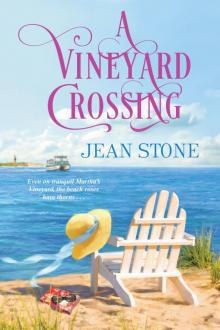 A Vineyard Crossing
A Vineyard Crossing A Vineyard Christmas
A Vineyard Christmas Beach Roses
Beach Roses Off Season
Off Season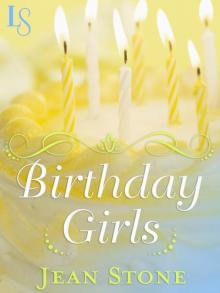 Birthday Girls
Birthday Girls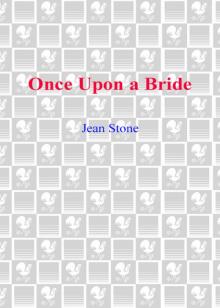 Once Upon a Bride
Once Upon a Bride Places by the Sea
Places by the Sea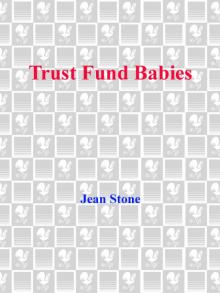 Trust Fund Babies
Trust Fund Babies The Summer House
The Summer House Tides of the Heart
Tides of the Heart Sins of Innocence
Sins of Innocence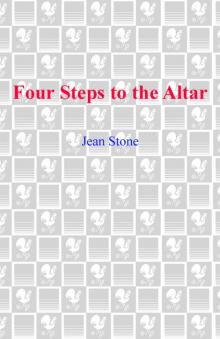 Four Steps to the Altar
Four Steps to the Altar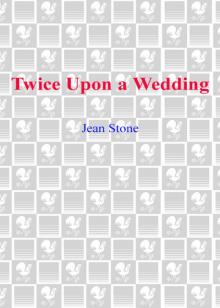 Twice Upon a Wedding
Twice Upon a Wedding Three Times a Charm
Three Times a Charm